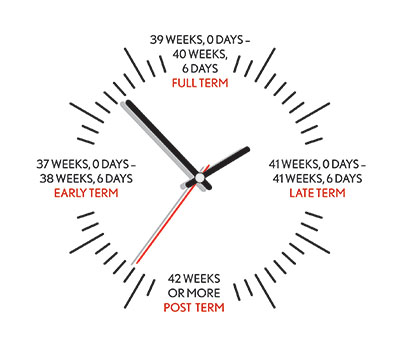 A typical pregnancy lasts 40 weeks, but few women give birth on their due date. In fact, the term "due date" can be misleading — it's simply an estimate. So when is the best time for your baby to arrive?
A typical pregnancy lasts 40 weeks, but few women give birth on their due date. In fact, the term "due date" can be misleading — it's simply an estimate. So when is the best time for your baby to arrive?
A baby born too soon can face a number of serious complications. For example, in the first few weeks of life, she can experience problems with her lungs, heart, blood, and digestive tract. Later in life, she is at higher risk for cerebral palsy, vision and hearing issues, and behavioral and cognitive challenges.
Until recently, a baby born any time after 37 weeks of pregnancy was considered "term" or fully developed. However, research shows that babies born just a few weeks early are also at increased risk for health problems. Health care providers now know that important developmental stages occur during the 37th and 38th weeks. As a result, experts have refined and given names to each of the specific periods related to term birth:

- Early Term: Babies born at 37 and 38 weeks. These babies are at higher risk for problems with breathing, feeding, and controlling their temperature than babies born later.
- Full Term: Babies born at 39 or 40 weeks. These babies are more ready to breathe on their own, can better coordinate sucking and swallowing for feeding, and can better hold their own body temperatures.
- Late Term: Babies born at 41 weeks. These babies are not that different from babies born at 40 weeks. Often babies not already born at 40 weeks just need a few more days before spontaneous labor begins. However, in the 41st week of pregnancy, the mother will need to be watched more closely (especially toward the end of the week), even though the risks are minimal. This is to make sure that the placenta continues to function adequately.
- Postterm: Babies born at 42 weeks or later. These babies may get less oxygen and fewer nutrients from the placenta and are at higher risk of needing neonatal intensive care. An induction of labor is required if spontaneous labor has not begun prior to 42 weeks.
Learn more about how these new labels affect your pregnancy by watching this video from nurse leader Dr. Mimi Pomerleau or visiting the National Institutes of Health's National Child & Maternal Health Education Program.
Debra Bingham, Dr.P.H., R.N., FAAN, is the Vice President of Nursing Research, Education, and Practice for the Association of Women's Health, Obstetric and Neonatal Nurses. She has over 30 years' experience in maternal-child health nursing. Most of Dr. Bingham's career has been spent working in hospital leadership positions at the front lines of health care, including as director of maternal-child health nursing for two hospitals in New York City and managing a large referral neonatal intensive care unit, a stand-alone birthing center, and a fetal evaluation unit. Dr. Bingham is an expert in quality improvement and implementation science and author of multiple journal articles and toolkits.

